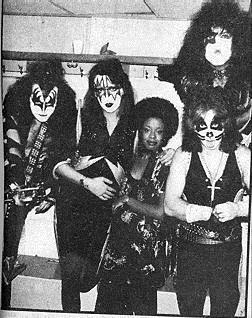
When I heard the news that Kiss was being included in the Rock and Roll Hall of fame, I shrieked with delight.
It was final validation for me and for them.
You see, I was probably the first newspaper rock critic to write about the band with anything resembling seriousness. I can still remember the day one of my Chicago Sun Times editors tossed a little poster on my desk advertising a "Kiss Off" contest at a huge shopping mall out in the Chicago suburbs.
He scowled at the PR shot of the band, and gave me the choice of covering it or not. And I have to admit, at the time, the makeup was "off-putting" to be sure.
But I called to let Casablanca's public relations people know I was interested, and a few days later, I found myself face-to-face with four remarkably charming young men, in what looked like full kabuki makeup. They were careful not to allow the press or fans see them without that makeup during those early days, but I actually didn't mind.
What impressed me more than the get up, though, were the band members themselves. Each had a distinct, delightful and well-developed persona. And they could hold their own in an interview, as if they'd been doing them forever -- their notoriously brilliant manager, Bill Aucoin, had trained them well.
But they'd also been coached by their bassist, Gene Simmons, with whom I had something more in common than music. We had both been high school English teachers before pursuing our true callings.
Gene was a huge surprise. In addition to his impressive academic background, he was also a walking encyclopedia of film history, who could recite all kinds of movie trivia for the asking. And he was a very shrewd businessman, on a campaign to convince every celebrity he met to take at least a few business courses, in oder to avoid being bamboozled by record companies, agents and managers.
I would later meet his mother -- all of their parents, at various events they invited me to, whether I was writing about them or not. In fact, I felt like their little sister, sometimes, tagging along with her rock star brothers. Those were heady times.
But that first time remains my fondest memory of all. They scared the bejabbers out of the adults we passed as they walked through the mall -- quite deliberately -- on their way to the place where the contest would be held. It was a silly affair, a "kissing contest" with rules I don't even remember.
What I do remember is how all the younger folks, especially the little ones, reacted to the makeup and costumes. Instead of being horrified like their parents, they ran to the band. They asked them about the makeup, the boots, what their personas were, and what they meant, and most of all, when they could buy their album. It was a stroke of genius -- they sold themselves just by walking through that mall.
So I realized quickly that I was seeing something big. And I hadn't even heard them play yet -- I had an album, but I hadn't seen them live. Neither had any of the kids. The outfits excited them; they wanted to know everything about these devil dolls.
I went back to my skeptical editors and said something Gene was very proud of in those early days. I told them, and everyone else I knew, that whether we liked them or not, they were going to be the next big thing. They might, in fact, make history.
Today, I discovered how right I was. Congratulations, my brothers. You did it.
Cynthia Dagnal-Myron's book of essays, The Keka Collection, can be purchased on Amazon.com.